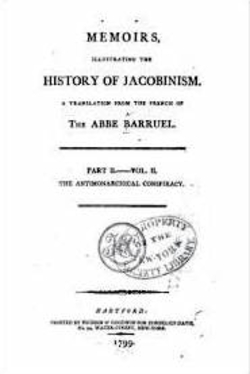 Augustin de Barruel (1741-1820). |
De Barruel's first volume, The Anti-Christian Conspiracy, deals with the Philosophes, showing how Voltaire and his colleagues plotted to destroy Christianity. Volume 2, Conspiracy of the Sophists and the Rebellion against Kings, shows how the same culprits plotted against monarchs and allied with the Freemasons to overthrow aristocratic privilege, private property, legitimate government, and Christianity. The last two volumes are jointly titled The Impious and Anarchic Conspiracy of the Sophists. Volume 3 concentrates on the Bavarian Illuminati and reveals their control over Freemasonry. Volume 4 ties the "triple conspiracy" into a single grand vision of history beginning with Mani, the Iranian prophet of dualism, and culminating in the French Revolution.
De Barruel popularized the ideas of his predecessors by making these more accessible and rigorous, at the same time that he extended the conspiracist argument further than any of them, the whole way back to ancient Iran. The Jacobin conspiracy for him was directed not just against Catholicism, the French monarchy, and the landowners but against religion, government, and private property as such. His was the first attempt to present conspiracy theories in an orderly and intellectually punctilious fashion. In the words of a twentieth-century historian, "the work by Barruel is a masterpiece; hatred and fear made him a poet."[2]
The Memoirs met a widely felt need for a unifying explanation of the French Revolution and so had an immediate and far-reaching appeal. Lengthy as the work was, it reached a vast audience. Sales boomed; author and publisher alike grew rich. By 1812, translations had appeared in Dutch, English, German, Italian, Polish, Portuguese, Russian, Spanish, and Swedish. The French edition remained in print until 1837; for many years, it was one of the most widely circulated books in Europe.
 Title page of vol. 1 of "Mémoires pour servir à l'histoire du Jacobinisme." |
Even those who disagreed with de Barruel had to contend with him. Percy Bysshe Shelley (1792-1822) took issue with his arguments but studied him carefully.[4] Thomas De Quincey (1785-1859) recorded his youthful struggle with de Barruel's ideas.[5] The conservative political philosopher Joseph de Maistre (1753-1821) devoted great effort to refuting de Barruel ("this rot Illuminism is an effect, not a cause").[6]
Conspiracy theorists with alternate theories for the French Revolution replied to de Barruel, for example, pinning responsibility for this episode on the Jesuits. The most important refutation, by Jean-Joseph Mounier (1758-1806), appeared in 1801. In de Barruel's work, Mounier complained, "To causes extremely complicated have been substituted simple causes, adapted to the capacity of the most indolent and superficial minds."[7] De Barruel's ideas also spurred a backlash of ridicule. In a 1797 play, George Farquhar's The Beaux' Stratagem, Scrub exposed its underlying logic: "First, it must be a plot because there's a Woman in't; secondly, it must be a Plot because there's a Priest in't; thirdly, it must be a plot because there's French Gold in't; and fourthly, it must be a Plot, because I don't know what to make on't."[8]
 An English translation from 1799. |
The Memoirs still stand out as "the great classic of conspiracy theory,"[10] "the bible of the secret society mythology and the indispensable foundation of future anti-masonic writing."[11] Even today, although his name is obscure, de Barruel's legacy remains alive, an influence on almost all conspiracist writing on secret societies. In the 1970s alone, his Memoirs was republished twice, and a Societé Augustin Barruel came into existence in Lyons.
NOTES
[1]. Abbé Barruel, Mémoires pour servir à l'histoire du Jacobinisme, 4 vols. (London: De l'imprimerie françoise, chez P. le Boussonnier, 1797-98). The book has been reprinted more than once in recent years, including Chiré-en-Montreuil: Diffusion de la Pensée Française, 1973. On de Barruel, see Sylva Schaeper-Wimmer, Augustin Barruel, S. J. (1741-1820): Studien zu Biographie und Werk (Frankfurt: Peter Lang, 1985); Michel Riquet, Augustin de Barruel: Un jésuite face aux Jacobins francs-maçons, 1741-1820 (Paris: Beauchesne, 1989). |
[2]. Le Forestier, Les Illuminés de Bavière, p. 688. |
[3]. Letter of 1 May 1797, in R. B. McDowell, ed., The Correspondence of Edmund Burke (Cambridge, Eng.: At the University Press, 1970), vol. 9, pt. 1, p. 319. |
[4]. Walter Edwin Peck, "Shelley and the Abbe Barruel," Modern Language Association of America, Publications 36 (1921): 348. |
[5]. Thomas De Quincey, "Secret Societies," in David Masson, ed., The Collected Writings of Thomas de Quincey (London: A. and C. Black, 1897), vol. 7, pp. 173-85. This article first appeared in Taft's Magazine in 1847. |
[6]. "[C]elle pourriture de l'illuminisme est un effect et non un cause," quoted in Roberts, Mythology of the Secret Societies, p. 296. |
[7]. Jean-Joseph Mounier, De l'influence attribuée aux Philosophes, aux Francs-Maçons et aux Illuminés sur la Révolution Française (Tübingen: Cotta, 1801), trans. J. Walker, The Influence Attributed to Philosophers, Free-Masons, and to the Illuminati on the Revolution of France (London: W. and C. Spilsbury, 1801), p. v. |
[8]. George Farquhar, The Beaux' Stratagem, act 4, scene 1. |
[9]. Jacques Droz, "La Légende due complot illuministe et les origines du romantisme politique en Allemagne," Revue historique 226 (1961): 313-38. |
[10]. Partner, Murdered Magicians, p. 131. |
[11]. Roberts, Mythology of the Secret Societies, p. 193. |
